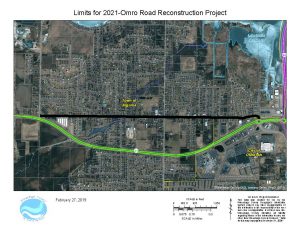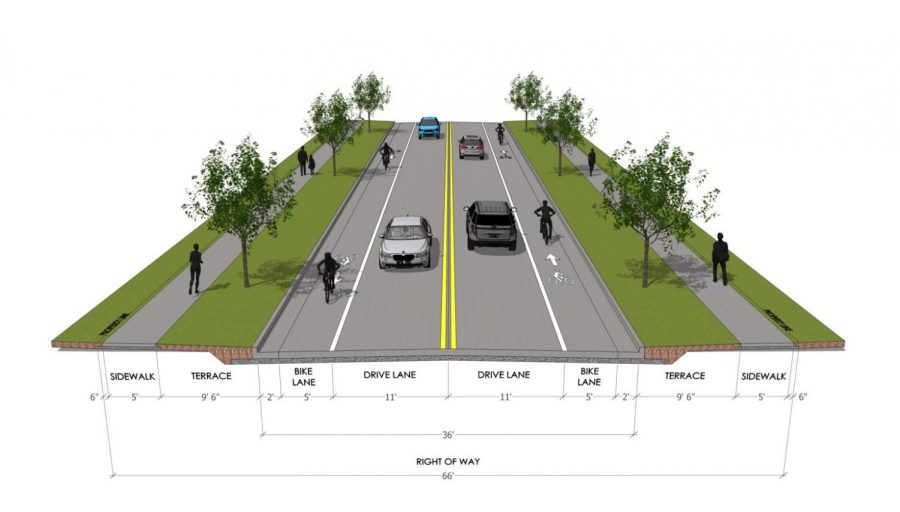Omro Road reconstruction moving ahead amid pushback
Courtesy of the Town of Algoma — This is a sample cross section that is intended to be used for reference only and is not to scale or final design.
July 9, 2020
After years of discussion, a plan to reconstruct Omro Road is beginning to take shape, as the Town of Algoma has hired a private engineer to redesign the roadway, despite objections by a group of residents.
The project design will be approved by the state Department of Transportation in November — meaning the town will not know the total project cost or the tax burden on property owners until then.
However, the estimated project cost is roughly $5.5 million, but could be more depending on DOT requirements, contracting costs and other variables, according to Town Administrator Richard Heath.
The reconstruction aims to create a lasting infrastructure that will help connect communities while increasing safety for residents walking or biking along the road, he said.
“We’re trying to make it so that none of the residents in the Town of Algoma will have to deal with the road again beyond maintenance,” Heath said. “We want it to last for the next 75 years.”
Improvements to Omro Road will include the removal and replacement of the road’s driving surface and the installation of curbs, gutters, bike paths and sidewalks.
The project originated in 2017 when the Oshkosh Metropolitan Planning Organization — which includes the city of Oshkosh, the towns of Algoma, Black Wolf, Nekimi, Oshkosh and Vinland, and Winnebago County — applied for a grant from the DOT to reconstruct Omro Road.
A year later, the DOT awarded the MPO a $2.5 million grant, which will fund about half of the project costs and requires the installation of bike paths and sidewalks.
“All the other municipalities [in the MPO] agreed to forgo the funding in order for Omro Road to get that money,” Heath said, “because they all agreed Omro Road was in need of repair.”
Additionally, the Town of Algoma and the city of Oshkosh will share the cost of renovating the part of the road inside city limits. Algoma will fund the remainder of the project through a capital improvement loan.
Because municipalities in Wisconsin are limited in the amount of debt they can take on, Heath said Algoma will take the costs to property owners into account when deciding how to finance its portion.
“Depending on what our general fund looks like, we could pay for a portion of the project with our general fund, which will reduce the amount of loan that we take,” he said. “But since we don’t know the final cost of the project, we don’t know what impact it will have on taxpayers, but we have very definitive revenue caps that we have to follow.”
Some residents oppose the project, believing it will create an undue tax burden for “conveniences” they didn’t ask for, said Robert Sawitski, an Algoma resident who started a petition that has drawn 600 signatures opposing the project.
Sawitski said residents do not want a sidewalk, curb or gutters, and would prefer walking or bike paths adjacent to the road.
“A lot of people move out to the Town of Algoma for lower taxes, and a small-town community feel. The Town Board members are failing to realize that this [project] isn’t what our town wants,” he said. “If people wanted sidewalks or curb and gutters, they wouldn’t have moved to the Town of Algoma.”
However, Heath said the project will not create a drastic tax increase for residents. 
“We’re not looking at a 200% increase in our taxes — that’s just not realistic,” Heath said. “There’s restrictions on local governments as to how much we can raise taxes.”
Additionally, he says the curb and gutter will eliminate safety concerns such as steep ditches and flooding along the roadway.
“We’re working with all the homeowners, and we’re compensating them for any landscaping that will disturb the use of their property,” Heath said.
The reconstruction is expected to finish by spring 2022. In the meantime, Heath encourages residents with questions or concerns to attend Town Board meetings and contact local officials directly.
“If people have questions about it, it’s a lot easier to clarify stuff when we can talk about it,” Heath said. “We aren’t trying to ignore people’s concerns; I’ll talk to anyone about it. We’re not trying to hide anything.”














